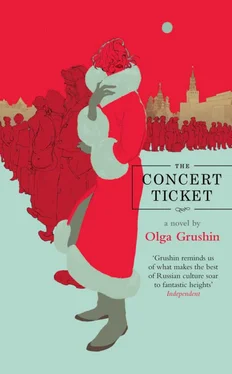His documents bore no mark of the evening’s events.
In another two or three minutes, he was through the gates.
The embassy’s façade was still ablaze, and as the light welled through the bright silk draperies, the snow along the wrought-iron fence glimmered in pale squares of crimson and green and blue. A few steps beyond, they were cast into the darkness, the chill, the silence. Horns, trombones, and a timid, bug-eyed violin exchanged dispirited farewells and trudged off in different directions; snow crunched for some minutes, then all was quiet again.
“Well, that was some party,” Sviatoslav said, his massive jowls shuddering with a flattened yawn. “Sure, their music’s fluff, but they know how to have a good time, you have to give them that.” He brought his face close to Sergei’s. “Don’t tell anyone, this is risky, but I smuggled something out for my better half, look—”
Blindly Sergei nodded at the confusion of crumbs wrapped in a greasy napkin.
“Hey, want to drop by my place, have a drink? I tell you, the women we saw tonight, all trotting about like giraffes in those heels! Too skinny, though, if you ask me—”
“Listen, I’m worn out,” Sergei said. “See you at the theater, all right?”
The last of the trolleys had ceased running hours earlier, in the previous year; the first day of January pressed heavily onto the ground. As he strode through the deserted city, he thought of the New Years of his childhood, before he was ten, before the Change, when the city had still glowed with the soft, deep enchantment of sugared angels spreading their sparkling wings in bakery windows, and bells whose limpid sounds rose like the sea at a moonlit tide, and glass ornaments turning slowly this way and that on dark tree branches, gathering in their reflections the whole wondrous, promise-filled world.
His fingers were tightly curled around the mysterious object in his pocket—his own, private communication from a different life.
He was not far from his building when he stopped. The street did not look familiar. There was a dilapidated church at one end, a squat little kiosk with a boarded window at the other. The solitary streetlamp was lavender in tint, low and sickly. He withdrew his hand, unlocked his cramping fingers, looked at the small sky-blue box on his palm. It was made of cardboard; one side was blank, the other had two words engraved on it. He deciphered the foreign script, which he had learned as a boy. Café Apollo , the letters spelled out in curly gold. With a careful finger, he pushed at the inside of the box, ready to receive the final mystery.
The inner compartment slipped out.
There were matches in it. Sturdy white matches with generous red and yellow tips.
Sergei gazed at the matches for a long minute, until his fingers began to burn with cold, then gave a laugh so short and harsh it sounded like a bark, and threw the foreign matchbox into the night—and the night seemed to solidify, to lunge toward him in a flowing, shifting shape. He felt a stab of indistinct yet acute fear, then, blinking, saw it was only an old man in an odd baggy cape, of the kind gnarled hermits wore in the lavish illustrated books he had found as a child underneath the glittering tree.
The old man brushed the snow off his knees, stepped forward into the light.
“Matches falling from the sky into my lap, must be my lucky day,” he said, smiling. “Now, if only I could get some cigarettes. You don’t smoke, do you?”
Sergei shook his head, already moving off.
“Didn’t think so, or you wouldn’t be throwing good matches away,” the old man observed to himself. “Curious, what’s this, something written on it, let me see if I can make it out, my eyes aren’t what they used to be… ‘I-gor Se-lin-sky,’ yes, that’s it, Igor Selinsky—”
He was back in one leap, snatching the matchbox from the old man’s grasp, turning it in the streetlamp’s scanty light, forgetting to breathe, yes, indeed, he had missed it somehow—the golden engraving Café Apollo on one side, and on the other, scribbled in a hasty, almost indecipherable hand across the matchbox’s glossy underbelly: Igor Selinsky . He laughed and would have embraced the old man but did not, crying instead, “Keep it, keep it!”—pushing the matchbox into the man’s hands, hard and twisted like ancient tree bark, and running down the streets, and up the stairs, humming, no, singing, exuberantly singing the melody that had burst with such immediate triumph into his mind, that melody he had learned to play in his tenth year—the melody that, he had once believed, would change his whole life—a deceptively simple tune, simple and sad, one of Selinsky’s early pieces, yet already containing within it a promise, a dazzling promise of things that were to come but that never came, not for him, not for them, not here, not in this dark, cold place oppressed by winter—but somewhere else perhaps, yes, somewhere else for sure, somewhere luminous and bright and full of music, where life was like art and art like life, and soon to be his, theirs, here, because times were changing, because life was changing at last.
When he finally managed to control the shaking in his hands long enough to fit the key in the lock and push the door open and stumble inside, he was blinded by the light springing into life and his wife rising from the kitchen table.
“What’s that you’re singing?” she said, with a strange lapsing in her voice.
“Oh, Anya, you wouldn’t believe what just—” “But you’re traipsing snow everywhere!” she exclaimed, and, surging toward him, fussed about, shaking him out of his wet coat. “Did you have far to walk? Your shoes must be soaked through. Here, I’ll hang that… Do you think you’ve caught a cold? You’d better have a cup of tea, I’ll make it for you, sit down, sit down—”
He looked at the pots in the sink, their insides clotted with grayish lumps, and the pile of thick stockings in a basket on the windowsill, waiting their turn to be mended, and his wife’s broad back bending over the teakettle.
Silent now, he lowered himself onto a chair, began to pry his frozen shoelaces loose.
“Here,” she said, “nice and hot, with lemon… So what was that song, then?”
“Just something I heard on the radio the other day,” he said shortly.
He finished his cup, then walked off, leaving her at the table, and in the graying predawn bedroom fell into a humming, gleaming well, which overflowed with barely audible melodies he strove to hear through the rush of waters, and satin women playing cheerful little songs with silver spoons on ripened grapes, and, toward midmorning, when the light outside the window had grown broad and white, the old man with the scraggly beard and deep dark eyes standing under the streetlamp before the boarded-up kiosk, smiling a cunning smile.
4

THE FIRST TWO WEEKS of January there was no school. This fact made little difference to Alexander. As always, he left the apartment in the morning, and as always, he did not go to school. The second Friday of the new year found him sitting on a bench in a small park some blocks from home, watching pigeons root through the garbage that spilled out of trash cans. He was not all that curious about pigeons—indeed, he found them revolting, the way they appeared so puffy and glossy, so cozily substantial, but would, he knew, be skinny and tremulous to the touch, tiny, mousy bodies palpitating inside a ball of feathers. All the same, sitting here, in the cold, empty park, watching the birds, whiled away the time.
When the pigeons had stuffed their bellies with trash and waddled off, he rested his head against the bench’s back and did not move for many long minutes, staring upward at the flat gray sky that was sliding past him, unceasingly, quickly, spreading its wind-filled clouds like powerful sails and departing somewhere—perhaps toward another, brighter, deeper sky far, far away—leaving behind the pathetic park, the immobile city, the paralyzed day. At last he stirred as if awakening, sat up, groped for a splinter of a broken bottle under the bench, then proceeded to scratch his initials into its frozen wood; there was a bare patch amidst all the clumsy hearts, anatomical schematics, and equations that would never add up, all these adolescent confessions, O + N = LOVE.
Читать дальше













